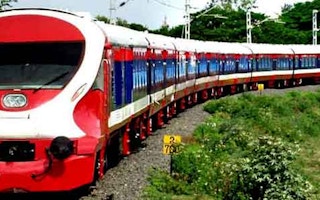Soon, solar power will be used to cool air conditioned train coaches. The Integral Coach Factory has kicked off a project in association with IIT Madras to design coaches that will draw power from the sun for interior lighting and cooling.
This is the first time the railways is attempting to tap solar power. Being the world’s biggest railway system, it plans to use innovative technology to tap alternative sources of energy to reduce dependence on fossil fuel and the power grid. The railways sees a huge demand for air conditioned coaches in the coming years. And this demand could lead to increased spending on diesel to power the coaches. In other countries, too, it is rare to use solar power on trains.
There are two ways to source power for air conditioning—power cars that use diesel and AC coaches that generate power from the speed of a train. Power cars are attached to trains like Shatabdi Express, Duronto and double decker trains while AC coaches of other trains have self-generating systems.
“We have asked IIT Madras to find ways to tap solar power and use it for interior lighting and air conditioning. An MoU was signed a month ago. We have started preliminary discussions with professors to work out different modalities to develop a feasible model to use solar power in running trains,” said a senior ICF official.
If the project is successful, the railways may be able to dispense with power cars. “We are yet to know if power cars can be eliminated because we have to find out the extent of power that can be drawn from solar panels and how much of that can be stored effectively. These issues will be looked at by the developers,” he added.
The new technology will be incorporated in the coaches designed by ICF. It is not clear how long it will take to complete the project.
Powering an air conditioned coach efficiently has become a huge challenge as trains run across different climate zones during a single trip. The air conditioning system has tripped on many trains, including the recently-introduced double-decker service between Chennai and Bangalore. Last year, passengers on a Chennai-Thiruvananthapuram train suffered when the air conditioning failed.
AC compartments often have trouble with the battery system needed to power the self-generator fixed near the wheels of the coach.
ICF has already turned to renewable energy to meet its needs and has set up a few wind mills to generate power in the southern districts of the state. The power is now being supplied to the grid.










